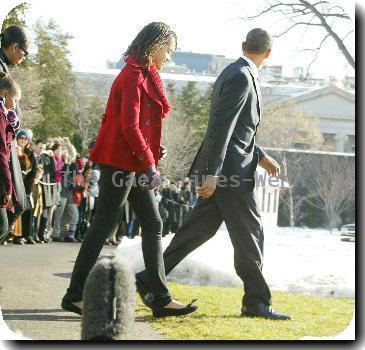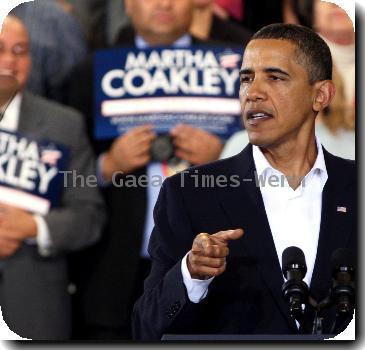Obama: Republicans and Democrats can work together to encourage job creation
By APTuesday, February 9, 2010
Obama: GOP and Dems together can spur job growth
WASHINGTON — Appealing for bipartisanship in a town where it’s hard to find, President Barack Obama sat down with Democrats and Republicans Tuesday to spur cooperation on job creation, deficit reduction and health care overhaul. He promised to do his part — but warned he would take Republicans to task if they don’t do the same.
“The people who sent us here expect a seriousness of purpose that transcends petty politics,” Obama said after the meeting, as he made a surprise appearance in the White House briefing room.
Obama’s appeal was his latest effort to reach out to Republicans following GOP Sen. Scott Brown’s surprise election last month to replace the late Democratic Sen. Edward Kennedy in Massachusetts. Brown’s win deprived Democrats of the votes they need to keep the Republican minority in the Senate from blocking Obama’s legislative agenda, including his plan to overhaul the nation’s health care system.
Obama started his remarks to reporters by engaging in a bit of wishful thinking: joking about Senate Democratic leader Harry Reid and Republican leader Mitch McConnell “out doing snow angels together on the South Lawn” after the meeting.
But the friendly rhetoric quickly gave way to tougher talk.
“We can’t afford grandstanding at the expense of actually getting something done,” Obama said. “What I won’t consider is doing nothing.”
McConnell told reporters that “there are some areas of potential agreement” on a jobs package.
He cited Republicans’ and Obama’s shared interests in nuclear power, clean coal technology, offshore drilling and the completion of languishing trade deals. He cautioned, though, that most of the members of his Republican caucus hadn’t yet seen the Democrats’ planned jobs legislation.
Obama, too, ticked off several areas where he said cooperation should be easy. But, like McConnell, most of the ideas on which he called for bipartisanship were ones he favors. In Obama’s case, that means job creation (money for infrastructure repairs, small business tax cuts and lending, and tax breaks for energy efficiency improvements), health care (extending coverage and making it more affordable) or deficit cutting (a bipartisan commission).
“I won’t hesitate to embrace a good idea from my friends in the minority party, but I also won’t hesitate to condemn … what I consider to be obstinacy,” Obama said.
He also threatened to act unilaterally to install his choices for several government vacancies that normally would require Senate confirmation, if his nominees continue to be held up. Presidents have the ability to make what are called recess appointments in such cases, though people installed that way can stay in the job only until the end of the next session of Congress.
Most recently, the White House had highlighted blocking action by Republican Sen. Richard Shelby of Alabama, who had placed a hold on about 70 of Obama’s nominees.
The president said bipartisanship doesn’t mean majority Democrats should give up everything they believe in and only work on a handful of things the Republicans want.
“That’s not how it works in any other realm of life,” he said. “It’s certainly not how it works in my marriage with Michelle — although I usually do give in most of the time.”
Obama met earlier Tuesday in the White House’s Cabinet Room with the top House and Senate leaders of both parties, plus numerous aides. It was the first time in two months that GOP leaders met with him in the White House.
Democrats control both chambers of Congress, but they cannot stop a Senate filibuster of legislation or a nominee if all 41 Republicans stand together. As a result, partisan feuding has stalled action on major issues.
A jobs bill may be within reach because both parties see employment as the most pressing matter for voters.
Democratic Sen. Chuck Schumer of New York and GOP Sen. Orrin Hatch of Utah are advocating a tax credit for businesses that hire new workers. It would refund the employer’s 6.2 percent share of the Social Security payroll tax to companies that hire employees this year.
Obama has expressed openness to the idea, although he proposed a different mechanism for refunding. He would grant a $5,000 tax break for businesses that hire a new worker or increase wages or hours for current workers in 2010. The incentive would be tailored to appeal mainly to small businesses.
The president told reporters that eliminating capital gains for small businesses and finding ways to help community banks lend to smaller firms are ripe for bipartisan agreement, and said that passing something quickly — even if not ideal in his mind — could be important to build momentum toward greater achievements.
“It’s realistic for us to get a package moving quickly that may not include all the things that I think need to be done,” he said. “It may take a series of incremental steps.”
Republicans sounded wary of Obama’s call for a bipartisan forum on health care on Feb. 25.
“It’s going to be very difficult to have a bipartisan conversation with regard to a 2,700-page health care bill that the Democrat majority in the House and the Democrat majority in the Senate can’t pass,” said House Minority Leader John Boehner, R-Ohio. “It really is time to scrap the bill and start over.”
Obama said he’s willing to start from scratch but that both sides must give ground. He also said that the final bill must meet his goals, such as ending abusive insurance industry practices, reducing costs and expanding the affordability of and access to coverage.
The president said he intends for the meeting to be a serious conversation. “My hope is this doesn’t end up being political theater,” he said. “We have an obligation, both parties, to tackle this issue in a serious way,” he said.
(This version CORRECTS length of recess appointments)
Tags: Barack Obama, District Of Columbia, Edward Kennedy, Geography, Health Care Reform, North America, Personnel, Political Issues, Political Organizations, Political Parties, Snow, United States, Washington










